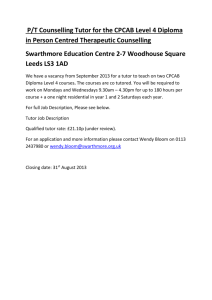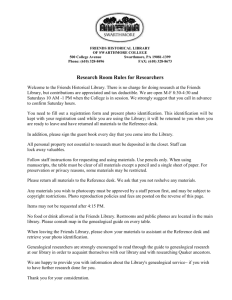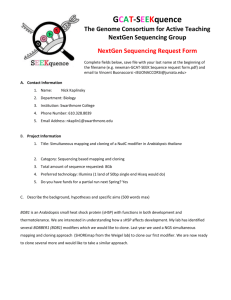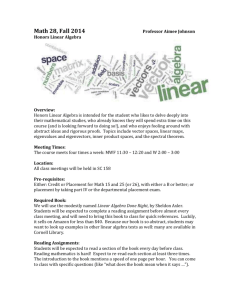Workshop Summary Page
advertisement
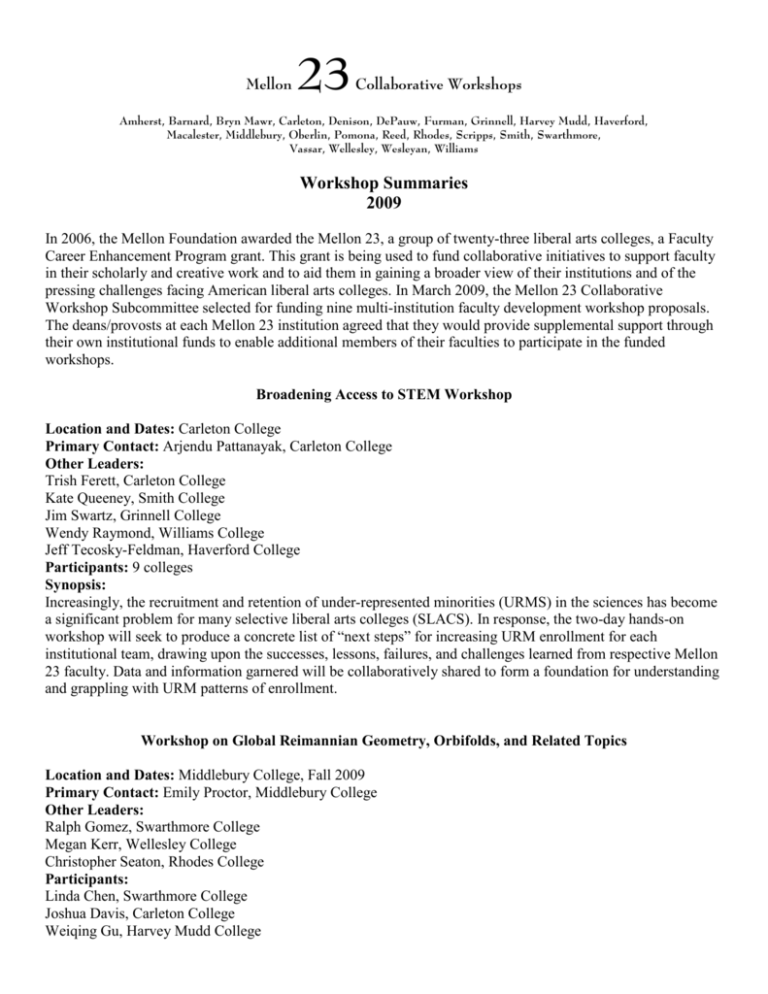
Mellon 23 Collaborative Workshops Amherst, Barnard, Bryn Mawr, Carleton, Denison, DePauw, Furman, Grinnell, Harvey Mudd, Haverford, Macalester, Middlebury, Oberlin, Pomona, Reed, Rhodes, Scripps, Smith, Swarthmore, Vassar, Wellesley, Wesleyan, Williams Workshop Summaries 2009 In 2006, the Mellon Foundation awarded the Mellon 23, a group of twenty-three liberal arts colleges, a Faculty Career Enhancement Program grant. This grant is being used to fund collaborative initiatives to support faculty in their scholarly and creative work and to aid them in gaining a broader view of their institutions and of the pressing challenges facing American liberal arts colleges. In March 2009, the Mellon 23 Collaborative Workshop Subcommittee selected for funding nine multi-institution faculty development workshop proposals. The deans/provosts at each Mellon 23 institution agreed that they would provide supplemental support through their own institutional funds to enable additional members of their faculties to participate in the funded workshops. Broadening Access to STEM Workshop Location and Dates: Carleton College Primary Contact: Arjendu Pattanayak, Carleton College Other Leaders: Trish Ferett, Carleton College Kate Queeney, Smith College Jim Swartz, Grinnell College Wendy Raymond, Williams College Jeff Tecosky-Feldman, Haverford College Participants: 9 colleges Synopsis: Increasingly, the recruitment and retention of under-represented minorities (URMS) in the sciences has become a significant problem for many selective liberal arts colleges (SLACS). In response, the two-day hands-on workshop will seek to produce a concrete list of “next steps” for increasing URM enrollment for each institutional team, drawing upon the successes, lessons, failures, and challenges learned from respective Mellon 23 faculty. Data and information garnered will be collaboratively shared to form a foundation for understanding and grappling with URM patterns of enrollment. Workshop on Global Reimannian Geometry, Orbifolds, and Related Topics Location and Dates: Middlebury College, Fall 2009 Primary Contact: Emily Proctor, Middlebury College Other Leaders: Ralph Gomez, Swarthmore College Megan Kerr, Wellesley College Christopher Seaton, Rhodes College Participants: Linda Chen, Swarthmore College Joshua Davis, Carleton College Weiqing Gu, Harvey Mudd College Martin Magid, Wellesley College Janet Talvacchia, Swarthmore College Lisa Traynor, Bryn Mawr College Synopsis: Riemannian geometry, a highly complex subdivision of geometry, is the product of a variety of manifolds, orbifolds, and Lie groups, and is often viewed as too challenging a topic to be explored in undergraduate institutions. The workshop will bring together Riemannian geometers, with the intent of collaborating on the best approaches for introducing Riemannian geometry into a greater percentage of undergraduate classrooms. Scholars will also work together to devise methods and approaches for recruiting fellow Riemannian geometers to work at liberal arts institutions. Apuleius, Colonial of the Roman Empire Location and Dates: April 29-May 1, 2010 Primary Contact: Benjamin Todd Lee, Oberlin College Other Leaders: Ellen Finkelpearl, Scripps College Benjamin Todd Lee, Oberlin College Sonia Sabnis, Reed College Participants: Christopher Chinn, Pomona College Pawan Dhingra, Oberlin College Robert Germany, Haverford College Kirk Ormand, Oberlin College Thomas Van Nortwick, Oberlin College David Roselli, Scripps College Nancy Shumate, Smith College William Turpin, Swarthmore College Drew Wilburn, Oberlin College Synopsis: Little research has focused on the origins of Apuleius, author of The Golden Ass, who lived in a small Roman province in Africa. The workshop will offer Classics scholars and faculty interested in Comparative Literature, English, North African and Middle Eastern studies the ability to share and collaborate on the relevance of today’s perceptions of Apuleius to the realities of the ancient world, as well as explore how literary work provides insight into provincial cultures. Conclusions drawn from the workshop will be used to enhance existing and generate new Classics courses at undergraduate institutions. Learning and Teaching Physical Sciences in the Liberal Arts College: Forging a Research Agenda Location and Dates: TBD Primary Contact: Lynne A. Molter, Swarthmore College K. Ann Renninger, Swarthmore College Other Leaders: Faculty from Carleton and Smith Participants: Two faculty members from each of 4 institutions Synopsis: While the sciences are highly successful fields of study, undergraduate enrollment rates have confirmed that most students, especially women, minorities, and first-generation students, concentrate in the social sciences and humanities. The workshop will allow for a collaboration of insights used to explain the reasons why women, minorities and first-generation students attending small colleges matriculate away from the physical 2 sciences. In doing so, participants will be able to collect and act upon a variety of different questions raised that are relevant to the physical sciences and enrollment rates at their own institutions. Workshop in Linguistics Location and Dates: October 2-4, 2009, Swarthmore College Primary Contact: Donna Jo Napoli, Swarthmore College Other Leaders: Robert Remez, Barnard College Mike Flynn, Carleton College Mary Paster, Pomona College Jill de Villiers, Smith College Participants: John Rager, Amherst Jason Kandybowicz, Bryn Mawr/Haverford/Swarthmore Catherine Fortin, Carleton Shizhe Huang, Haverford John Spackman, Middlebury Kim Faber, Oberlin Kim Bruce, Pomona Eric Breck, Rhodes Sasha Kostina, Rhodes David Harrison, Swarthmore Andrea Levitt, Wellesley Nathan Sanders, Williams Ann Senghas, Barnard Brigittine French, Grinnell Christina Esposito, Macalester John Haiman, Macalester Sasha Kostina, Rhodes Peter de Villiers, Smith Vera Lee Schoenfeld, Swarthmore Deepak Kumar, Bryn Mawr Matt Person, Reed Ted Fernald, Swarthmore Donna Jo Napoli, Swarthmore Synopsis: In recent years, the study of linguistics has expanded to include not only cognitive and documentary linguistics, but also computational and neuro-linguistics. Attention must be given to how these new fields are to be applied both in the classroom, as well as within the larger social context. The workshop will focus on the ways in which linguistics is currently presented to students, seeking to discover new and innovative courses, which can sufficiently address the many different applications of linguistic study. Scholars will also build upon studentteacher relations with the intent of increasing engagement in student -based research. Diaspora and Gender Workshop Location and Dates: Vassar College, Spring 2010 Primary Contact: Linta Varghese, Vassar College 3 Other Leaders: Eve Dunbar, Vassar College Participants: Bakirathi Mani, Swarthmore College Caroline Melly, Daphne Lamothe, Smith College Gina Ulysse, Wesleyan College Monica Miller, Barnard College Stephane Robolin, Williams College Anita Mannur, Dennison College Synopsis: Gender and diaspora has been approached in two ways. One standpoint focuses on women in diasporic settings, while the other views diaspora through a feminist lens. Gendered analyses of diaspora have proved limiting, and attention must be given to the ways in which gendered perceptions have deconstructed the notion of diaspora, as well as how gendered views will influence the eventual demise or resurgence of diaspora. The workshop will allow scholars to apply their recent research in the areas of gender and diaspora to a discussion focusing on the recent changes in Black and South Asian Diaspora Studies. Interchange from the workshop will be captured by a special journal issue exploring the notion of diaspora and its relation to gender conceptualizations, and from this work, an interpretation of diaspora, independent of gender, will be derived. Teaching During Wartime: Security Studies in the Liberal Arts Location and Dates: TBD Primary Contact: Stacie Goddard, Wellesley College Paul MacDonald, Williams College Alexander Montgomery, Reed College Other Leaders: Eric Chenoweth, Wesleyan University Brent Durbin, Smith College Participants: Dominic Tierney, Swarthmore College Nicholas de Warren, Wellesley College Craig Murphy, Wellesley College Larry Rosenwald, Wellesley College Alexander Cooley, Barnard College Marnie Anderson, Smith College James Wood, Williams College Kimberly Marten, Barnard College James McAllister, Williams College Susanna Wing, Haverford College Barak Mendelsohn, Haverford College Peter Just, Williams College Michael Pesenson, Swarthmore College Jon Western, Mount Holyoke College Paul Silverstein, Reed College Synopsis: The ongoing war between the United States and terrorism has posed much concern for how security issues are brought to the classroom. Some students have been exposed to war, while others have limited experience or knowledge. Differences in personal background call for a new evaluation of the appropriateness and relevance of how security issues are currently being taught. The workshop will allow participants to address the scope of challenges experienced by those teaching security studies, and will breed conversations for innovation during 4 four roundtable discussions pertaining to war and the classroom, curriculum planning, innovative pedagogy, and research. Journal articles and new pedagogical tools will be produced as a result. Feminist Ethics and Women’s Studies—Renewal Location and Dates: DePauw University Primary Contact: Meryl Altman, DePauw University Other Leaders: Jennifer Everett, DePauw University Kerry Pannell, DePauw University Kristin Bumiller, Amherst College Gill Wright Miller, Denison University Astrid Henry, Grinnell College Marianne de Laet, Harvey Mudd College Sujata Moorti, Middlebury College Tamara Metz, Reed College Susan Castagnetto, Scripps College Diane Harriford, Vassar College Mary Lyndon Shanley, Vassar College Participants: Synopsis: In June 2007, new initiatives were taken to bridge the gap between women’s studies programs and feminist ethics. Based on this past endeavor, the workshop will continue to explore the relationship between women’s studies and feminist ethics, as participants will discuss gender, sex, the body, intersectionalities and privilege, care and dependency, health issues, poverty, personal politics, sexual ethics, public policy, art, as well as additional research-related topics, with the intent of developing new and exciting courses for students at participating institutions. Integrating Inter-College Undergraduate Research Affiliations to a Multi-Campus Environmental Analysis Program at the Firestone Center for Restoration Ecology, Costa Rica Location and Dates: Firestone Center, Costa Rica, first week of June Primary Contact: Donald A. McFarlane, Scripps College Participants: Newton Copp, Scripps College Kristina Mead, Denison University Char Miller, Pomona College Gene Fowler, Pomona College Jen Houghton, Rhodes College David Harris, Harvey Mudd College Carol Brandt, Pitzer College Synopsis: The Firestone Center for Restoration Ecology (FCRE) has been utilized for sustainability efforts since 1993. The five day workshop is intended to build a coalition between researchers and students who will utilize the Creating Inter-College Undergraduate Research Affiliations Toward a Multi-campus Environmental Analysis Program at the Firestone Center to not only gain on-sight experience, but to also help achieve restoration efforts in the lowlands. Other topics of exploration will also include human land use patterns, small-scale climate studies, and insect biodiversity. Through this workshop, researchers and students from a variety of different backgrounds will be able to come together for one ecological purpose, bringing with them a vast array of different ideas and knowledge. 5
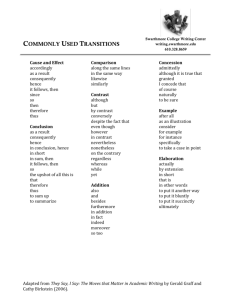
![Reading Strategies for Textbooks [doc]](http://s3.studylib.net/store/data/006747703_1-51c5546247305949ad82bea621c6803f-300x300.png)
